‘Not our president’: after Macron’s visit, New Caledonia’s Kanak demand their own futur
Mathurin Derel in Nouméa and Ben Doherty
Mathurin Derel in Nouméa and Ben Doherty
Fri 24 May 2024
THE GUARDIAN
“I don’t know why our fate is being discussed by people who don’t even live here.”
The 52-year-old Indigenous Kanak – who gave his name as Mike – spoke from a roadblock just north of New Caledonia’s capital, in the hours before France’s president arrived in the Pacific territory that has been paralysed by violent protests.

‘We will fight until Kanaky is free’: how New Caledonia caught fire
The demonstrations began on 13 May sparked by voting reforms proposed by the French parliament. Looting, arson and clashes have left six people dead, hundreds injured and widespread damage. The unrest comes amid underlying concerns over inequality and longstanding efforts in New Caledonia to secure independence.
The voice of local Kanaks “is not being listened to”, Mike said.
Macron’s rushed visit was, even in the words of his own advisers, “double or quits … a bet”.
But while he sought meetings across the political divide and acknowledged that inequalities had widened, his language, too, was revealing.
“The return of republican order,” he said pointedly, “is the priority.”
He left New Caledonia after 18 hours on the ground, promising that the reforms that would give voting rights to tens of thousands of non-Indigenous residents would not be pushed through by force, but the situation would be reviewed again within a month.
On the roadblocks, protesters say a delay is not enough, and that the reforms should be withdrawn.

THE GUARDIAN
“I don’t know why our fate is being discussed by people who don’t even live here.”
The 52-year-old Indigenous Kanak – who gave his name as Mike – spoke from a roadblock just north of New Caledonia’s capital, in the hours before France’s president arrived in the Pacific territory that has been paralysed by violent protests.

‘We will fight until Kanaky is free’: how New Caledonia caught fire
The demonstrations began on 13 May sparked by voting reforms proposed by the French parliament. Looting, arson and clashes have left six people dead, hundreds injured and widespread damage. The unrest comes amid underlying concerns over inequality and longstanding efforts in New Caledonia to secure independence.
The voice of local Kanaks “is not being listened to”, Mike said.
Macron’s rushed visit was, even in the words of his own advisers, “double or quits … a bet”.
But while he sought meetings across the political divide and acknowledged that inequalities had widened, his language, too, was revealing.
“The return of republican order,” he said pointedly, “is the priority.”
He left New Caledonia after 18 hours on the ground, promising that the reforms that would give voting rights to tens of thousands of non-Indigenous residents would not be pushed through by force, but the situation would be reviewed again within a month.
On the roadblocks, protesters say a delay is not enough, and that the reforms should be withdrawn.

View image in fullscreenEmmanuel Macron arrives at the central police station in Noumea. Photograph: Marin Ludovic/ABACA/REX/Shutterstock
“The statements of president Macron are disappointing,” said a 51-year-old Kanak on Friday, from a roadblock.
“We are exactly at the same point. He continues to let the situation deteriorate without making a strong gesture to calm things down.”
“The solution won’t come from the state, it will come from the Caledonians,” activist Jean-Pierre Xowie, a member of pro-independence FLNKS, told French television from New Caledonia ahead of the presidential visit.
Macron said security forces would remain as long as necessary. But FLNKS spokesperson Jimmy Naouna insisted the presence of French security forces – more than 3,000 are now on the ground, mostly in and around Noumea – was inflaming the situation.
“You can’t keep sending in troops just to quell the protests, because that is just going to lead to more protests,” he told the ABC’s Pacific Beat.
“By deploying the army, what are we doing here? This is not a war-torn country. We are not terrorists, as they say” said Joseph, an activist posted at a checkpoint in Dumbéa, north of Nouméa.
 View image in fullscreenProtesters wave Kanak flags at a roadblock in Noumea. Photograph: MMIIAS/ABACA/REX/Shutterstock
View image in fullscreenProtesters wave Kanak flags at a roadblock in Noumea. Photograph: MMIIAS/ABACA/REX/Shutterstock
Naouna said New Caledonia’s current conflagration was a “political situation so there needs to be a political solution”.
But on the barricades that have shot up around the territory, blocking major roads and infrastructure, activists make clear that there are economic and social aspects to these protests too; anger at the state among Kanaks is not confined to the voting reform issue.
Young people say ‘they are ready to die’
Lélé, a 41-year-old activist, unaffiliated with a political party, is extremely active on social media, showing the world what is happening in New Caledonia.
“The Kanak are not being recognised for their true worth, they want a fair redistribution of wealth. What we ask of Macron is to recognise the legitimacy of the Kanak,” said Lélé.
While many Kanak do not condone the recent violence, just as many understand the anger of disillusioned youth.
“We hear young people saying they are ready to die at the checkpoints … That shows how deeply they are affected in their dignity,” said Djamil, who is married to a Kanak woman and sympathises with the independence movement.
“Macron is stuck in his opinions. He hasn’t really taken the true measure of what is happening … He made a big mistake by letting the country get bogged down.”
 View image in fullscreenA patrol by gendarmes on Thursday secures the route taken by president Macron. Photograph: Chabaud Gill/ABACA/REX/Shutterstock
View image in fullscreenA patrol by gendarmes on Thursday secures the route taken by president Macron. Photograph: Chabaud Gill/ABACA/REX/Shutterstock
At immediate issue for France’s president was the proposed electoral reform bill, but the island territory is marked by deep disparities; the poverty rate among indigenous Kanaks, the largest community, is 32.5%, compared to 9% among non-Kanaks, according to the 2019 census.
Those disparities are even clearer within education and employment statistics. Only 8% of Kanaks hold a university degree and 46% hold no high school diploma. Meanwhile, 54% people of European background are university educated, with that proportion falling to 24% among people of mixed-heritage, the 2019 census shows.
Apparently referring to past efforts at widening opportunity, Macron said on Thursday that “rebalancing has not reduced economic and social inequalities, they have even grown”.
The broader impasse remains New Caledonia’s contested independence process.
Referendums between 2018 and 2021 saw a majority of voters choose to have New Caledonia remain part of France, instead of backing independence. The pro-independence movement rejected the results of the last referendum, held in 2021, which they had boycotted on the grounds that it was held at the height of the coronavirus pandemic. The movement had called on Kanaks not to participate in the vote, arguing that Covid had made pro-independence campaigning impossible, as entire villages observed customary mourning rites.
The three referendums were held under the Noumea accord struck with France in 1998, and the third referendum, in 2021, arguably brought that process to its conclusion. A previous referendum on independence, in 1987, had also failed.
Under the 1998 accord, new arrivals to New Caledonia were barred from enrolling to vote, in order to maximise Kanaks’ voting power. With the referendums concluded, the French government has moved to finally grant the vote to overseas-born, long-term residents voting rights.
Still, many Kanak people in New Caledonia continue to push for independence.
Drone footage of New Caledonia capital shows damaged buildings as Macron arrives – video
“Macron is welcome, but he is not our president,” said Axel, 21, who defines himself as a child of Kanaky, the name given to New Caledonia by the independence activists.
Protesters will finish the fight of 30 years ago, said Axel, referring to a period of violent unrest in the territory.
“Those who respect the Kanak people can live in peace with us,” the 51-year-old Kanak protester said on Friday.
“As long as there is no independence, there will be no security.”
With agencies
“The statements of president Macron are disappointing,” said a 51-year-old Kanak on Friday, from a roadblock.
“We are exactly at the same point. He continues to let the situation deteriorate without making a strong gesture to calm things down.”
“The solution won’t come from the state, it will come from the Caledonians,” activist Jean-Pierre Xowie, a member of pro-independence FLNKS, told French television from New Caledonia ahead of the presidential visit.
Macron said security forces would remain as long as necessary. But FLNKS spokesperson Jimmy Naouna insisted the presence of French security forces – more than 3,000 are now on the ground, mostly in and around Noumea – was inflaming the situation.
“You can’t keep sending in troops just to quell the protests, because that is just going to lead to more protests,” he told the ABC’s Pacific Beat.
“By deploying the army, what are we doing here? This is not a war-torn country. We are not terrorists, as they say” said Joseph, an activist posted at a checkpoint in Dumbéa, north of Nouméa.
 View image in fullscreenProtesters wave Kanak flags at a roadblock in Noumea. Photograph: MMIIAS/ABACA/REX/Shutterstock
View image in fullscreenProtesters wave Kanak flags at a roadblock in Noumea. Photograph: MMIIAS/ABACA/REX/ShutterstockNaouna said New Caledonia’s current conflagration was a “political situation so there needs to be a political solution”.
But on the barricades that have shot up around the territory, blocking major roads and infrastructure, activists make clear that there are economic and social aspects to these protests too; anger at the state among Kanaks is not confined to the voting reform issue.
Young people say ‘they are ready to die’
Lélé, a 41-year-old activist, unaffiliated with a political party, is extremely active on social media, showing the world what is happening in New Caledonia.
“The Kanak are not being recognised for their true worth, they want a fair redistribution of wealth. What we ask of Macron is to recognise the legitimacy of the Kanak,” said Lélé.
While many Kanak do not condone the recent violence, just as many understand the anger of disillusioned youth.
“We hear young people saying they are ready to die at the checkpoints … That shows how deeply they are affected in their dignity,” said Djamil, who is married to a Kanak woman and sympathises with the independence movement.
“Macron is stuck in his opinions. He hasn’t really taken the true measure of what is happening … He made a big mistake by letting the country get bogged down.”
 View image in fullscreenA patrol by gendarmes on Thursday secures the route taken by president Macron. Photograph: Chabaud Gill/ABACA/REX/Shutterstock
View image in fullscreenA patrol by gendarmes on Thursday secures the route taken by president Macron. Photograph: Chabaud Gill/ABACA/REX/ShutterstockAt immediate issue for France’s president was the proposed electoral reform bill, but the island territory is marked by deep disparities; the poverty rate among indigenous Kanaks, the largest community, is 32.5%, compared to 9% among non-Kanaks, according to the 2019 census.
Those disparities are even clearer within education and employment statistics. Only 8% of Kanaks hold a university degree and 46% hold no high school diploma. Meanwhile, 54% people of European background are university educated, with that proportion falling to 24% among people of mixed-heritage, the 2019 census shows.
Apparently referring to past efforts at widening opportunity, Macron said on Thursday that “rebalancing has not reduced economic and social inequalities, they have even grown”.
The broader impasse remains New Caledonia’s contested independence process.
Referendums between 2018 and 2021 saw a majority of voters choose to have New Caledonia remain part of France, instead of backing independence. The pro-independence movement rejected the results of the last referendum, held in 2021, which they had boycotted on the grounds that it was held at the height of the coronavirus pandemic. The movement had called on Kanaks not to participate in the vote, arguing that Covid had made pro-independence campaigning impossible, as entire villages observed customary mourning rites.
The three referendums were held under the Noumea accord struck with France in 1998, and the third referendum, in 2021, arguably brought that process to its conclusion. A previous referendum on independence, in 1987, had also failed.
Under the 1998 accord, new arrivals to New Caledonia were barred from enrolling to vote, in order to maximise Kanaks’ voting power. With the referendums concluded, the French government has moved to finally grant the vote to overseas-born, long-term residents voting rights.
Still, many Kanak people in New Caledonia continue to push for independence.
Drone footage of New Caledonia capital shows damaged buildings as Macron arrives – video
“Macron is welcome, but he is not our president,” said Axel, 21, who defines himself as a child of Kanaky, the name given to New Caledonia by the independence activists.
Protesters will finish the fight of 30 years ago, said Axel, referring to a period of violent unrest in the territory.
“Those who respect the Kanak people can live in peace with us,” the 51-year-old Kanak protester said on Friday.
“As long as there is no independence, there will be no security.”
With agencies
How is the violent unrest in New Caledonia impacting global nickel prices?
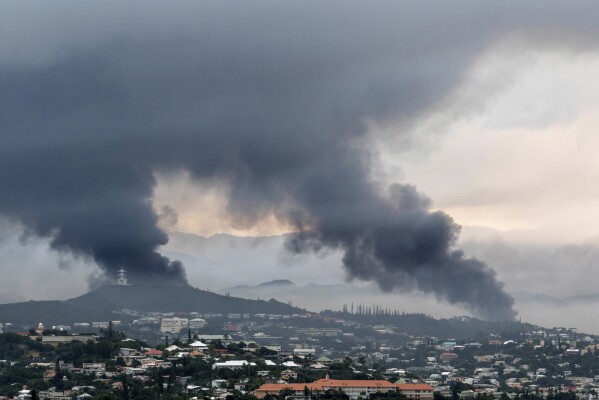
Smoke rises during protests in Noumea, New Caledonia, on May 15, 2024. Global nickel prices have soared since deadly violence erupted in the French Pacific territory of New Caledonia. (AP Photo/Nicolas Job, File)
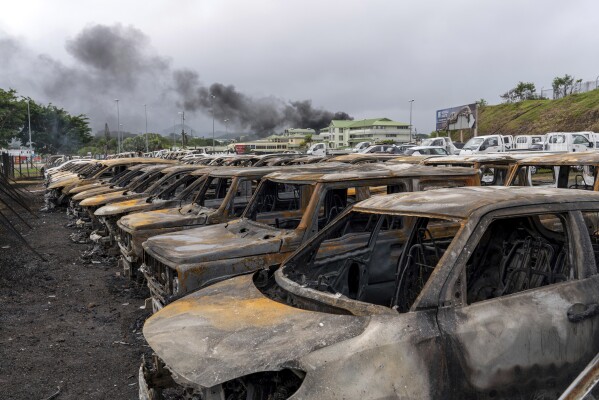
Burnt cars are lined up after unrest in Noumea, New Caledonia, on May 15, 2024. Global nickel prices have soared since deadly violence erupted in the French Pacific territory of New Caledonia. (AP Photo/Nicolas Job, File)
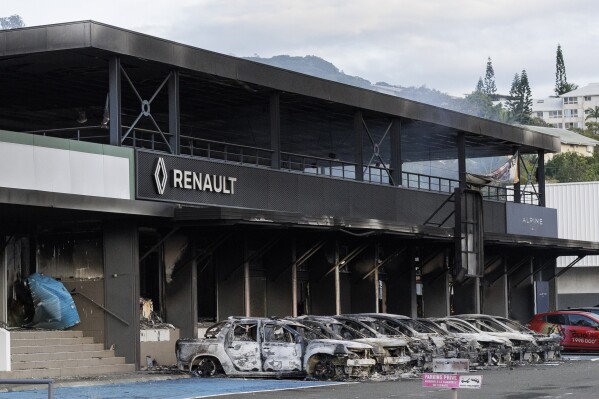
A burnt car store is pictured in Noumea, New Caledonia, on May, 14, 2024. Global nickel prices have soared since deadly violence erupted in the French Pacific territory of New Caledonia. (AP Photo/Cedric Jacquot, File)
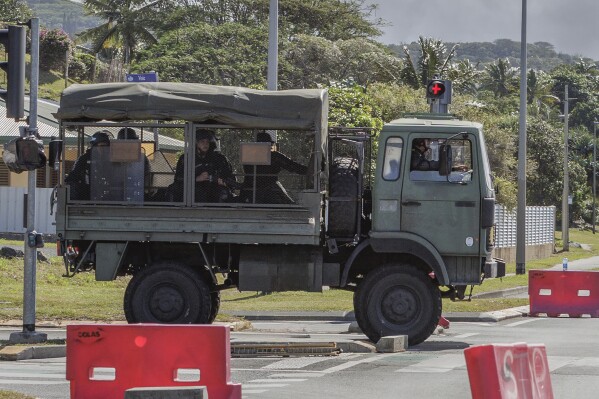
French gendarmes patrol the streets in Noumea, New Caledonia, on May, 16, 2024. Global nickel prices have soared since deadly violence erupted in the French Pacific territory of New Caledonia. (AP Photo/Cedric Jacquot, File)
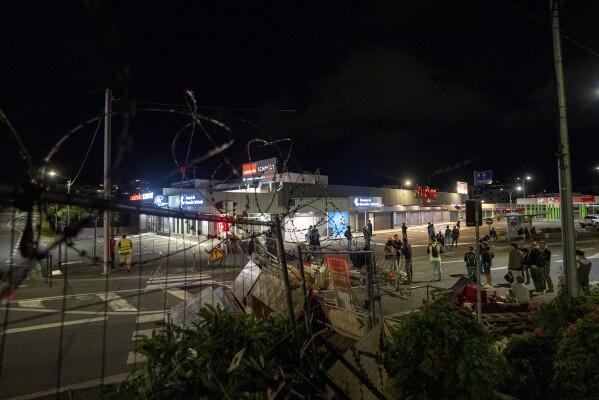
Residents stand in a blockade in Noumea, New Caledonia, on May, 15, 2024. Global nickel prices have soared since deadly violence erupted in the French Pacific territory of New Caledonia. (AP Photo/Nicolas Job, File)
BY VICTORIA MILKO
May 22, 2024
JAKARTA, Indonesia (AP) — Global nickel prices have soared since deadly violence erupted in the French Pacific territory of New Caledonia last week.
The overseas territory, which has been under French rule for over 170 years, is a major global producer of the critical material that is needed to make electric vehicle batteries, solar panels, steel and other everyday items.
Here’s a closer look at the global importance of New Caledonia’s nickel industry and why social unrest in the territory has impacted prices.
WHY ARE THERE PROTESTS IN NEW CALEDONIA?
Riots erupted after French lawmakers approved changes to the French Constitution that would allow residents who have lived in New Caledonia for 10 years to vote in provincial elections.
Opponents fear the measure will benefit pro-France politicians in New Caledonia, where pro-independence Indigenous Kanaks have long pushed to be free of France.
Kanaks are seeking independence for the archipelago of 270,000 people, while many descendants of French and other non-Indigenous people who have settled on the island want to remain part of France.
On May 15, France declared a 12-day minimum state of emergency on the island . It rushed in 1,000 troops to reinforce security forces that lost control of some parts of the capital, Nouméa.
WHY DOES NEW CALEDONIA MATTER TO THE GLOBAL NICKEL MARKET?
New Caledonia holds between 20-30% of the world’s nickel reserves. It is a huge part of the archipelago’s economy, compromising up to 90% of its exports and employing around a quarter of its workforce.
The European Union has named nickel as a critical raw material, which means it is economically and strategically important for the European economy but is considered to have a high-risk associated with its supply.
“Some of the discussion around France wanting to maintain its control over New Caledonia is motivated by its hopes to secure the large nickel deposits there, perhaps with an eye to future electric vehicle production,” said Nicholas Ferns, a research fellow at Monash University in Australia.
The United States and EU members have worked to secure their own critical material supply chains to catch up with China, which controls or is invested in a large share of the world’s supplies.
In 2021, EV maker Tesla invested in the Goro nickel mine when it was sold to a local consortium majority owned by local stakeholders.
WHY HAVE GLOBAL NICKEL PRICES SOARED?
Concerns over disruptions of supplies from New Caledonia due to the unrest and sanctions on metals including nickel from Russia have pushed global prices above $20,000 per ton for the first time since September.
The price of nickel on the London Metal Exchange rose to $21,275 per metric ton as of Tuesday from $18,510 on May 8, heading straight up after the unrest began.
The jump in prices came at the same time the Paris-based International Energy Agency said in a report that there could be future supply shortages of critical materials— including nickel— driven by “rapid” EV demand growth, mine closures and slowing investment.
“The high price of nickel will have most profound all-round impacts on the consumer,” said Lawrence Loh, a professor of strategy and policy at the National University of Singapore Business School. “We expect a trickle-down effect on the price increases of many consumer items which will lead to broader inflationary pressures.”
HOW IS NICKEL RELATED TO THE VIOLENT UNREST?
Although sharp jumps in commodities prices are disruptive for industries, New Caledonia’s nickel industry was in trouble even before the political crisis due to a 45% drop in global nickel prices last year.
That slammed the nickel industry-reliant economy. New Caledonia’s mining industry is struggling to compete against Indonesia, the world’s largest nickel producer, due to decades of export restrictions and high energy costs that have made its nickel more expensive and less profitable to produce. “The nickel industry is inevitably intertwined with the independence debate in New Caledonia,” said Ferns. “A downturn in nickel prices in recent years has exacerbated the economic issues in New Caledonia, which can then be connected to some of the factors involved in the recent riots.”
The French government has pledged to help maintain the territory’s nickel industry operations with subsidies.
___
Associated Press climate and environmental coverage receives support from several private foundations. See more about AP’s climate initiative here. The AP is solely responsible for all content.
VICTORIA MILKO
Milko is an Associated Press multimedia reporter covering the nexus of the energy transition, climate change and human rights across Asia-Pacific.
Smoke rises during protests in Noumea, New Caledonia, on May 15, 2024. Global nickel prices have soared since deadly violence erupted in the French Pacific territory of New Caledonia. (AP Photo/Nicolas Job, File)
Burnt cars are lined up after unrest in Noumea, New Caledonia, on May 15, 2024. Global nickel prices have soared since deadly violence erupted in the French Pacific territory of New Caledonia. (AP Photo/Nicolas Job, File)
A burnt car store is pictured in Noumea, New Caledonia, on May, 14, 2024. Global nickel prices have soared since deadly violence erupted in the French Pacific territory of New Caledonia. (AP Photo/Cedric Jacquot, File)
French gendarmes patrol the streets in Noumea, New Caledonia, on May, 16, 2024. Global nickel prices have soared since deadly violence erupted in the French Pacific territory of New Caledonia. (AP Photo/Cedric Jacquot, File)
Residents stand in a blockade in Noumea, New Caledonia, on May, 15, 2024. Global nickel prices have soared since deadly violence erupted in the French Pacific territory of New Caledonia. (AP Photo/Nicolas Job, File)
BY VICTORIA MILKO
May 22, 2024
JAKARTA, Indonesia (AP) — Global nickel prices have soared since deadly violence erupted in the French Pacific territory of New Caledonia last week.
The overseas territory, which has been under French rule for over 170 years, is a major global producer of the critical material that is needed to make electric vehicle batteries, solar panels, steel and other everyday items.
Here’s a closer look at the global importance of New Caledonia’s nickel industry and why social unrest in the territory has impacted prices.
WHY ARE THERE PROTESTS IN NEW CALEDONIA?
Riots erupted after French lawmakers approved changes to the French Constitution that would allow residents who have lived in New Caledonia for 10 years to vote in provincial elections.
Opponents fear the measure will benefit pro-France politicians in New Caledonia, where pro-independence Indigenous Kanaks have long pushed to be free of France.
Kanaks are seeking independence for the archipelago of 270,000 people, while many descendants of French and other non-Indigenous people who have settled on the island want to remain part of France.
On May 15, France declared a 12-day minimum state of emergency on the island . It rushed in 1,000 troops to reinforce security forces that lost control of some parts of the capital, Nouméa.
WHY DOES NEW CALEDONIA MATTER TO THE GLOBAL NICKEL MARKET?
New Caledonia holds between 20-30% of the world’s nickel reserves. It is a huge part of the archipelago’s economy, compromising up to 90% of its exports and employing around a quarter of its workforce.
The European Union has named nickel as a critical raw material, which means it is economically and strategically important for the European economy but is considered to have a high-risk associated with its supply.
“Some of the discussion around France wanting to maintain its control over New Caledonia is motivated by its hopes to secure the large nickel deposits there, perhaps with an eye to future electric vehicle production,” said Nicholas Ferns, a research fellow at Monash University in Australia.
The United States and EU members have worked to secure their own critical material supply chains to catch up with China, which controls or is invested in a large share of the world’s supplies.
In 2021, EV maker Tesla invested in the Goro nickel mine when it was sold to a local consortium majority owned by local stakeholders.
WHY HAVE GLOBAL NICKEL PRICES SOARED?
Concerns over disruptions of supplies from New Caledonia due to the unrest and sanctions on metals including nickel from Russia have pushed global prices above $20,000 per ton for the first time since September.
The price of nickel on the London Metal Exchange rose to $21,275 per metric ton as of Tuesday from $18,510 on May 8, heading straight up after the unrest began.
The jump in prices came at the same time the Paris-based International Energy Agency said in a report that there could be future supply shortages of critical materials— including nickel— driven by “rapid” EV demand growth, mine closures and slowing investment.
“The high price of nickel will have most profound all-round impacts on the consumer,” said Lawrence Loh, a professor of strategy and policy at the National University of Singapore Business School. “We expect a trickle-down effect on the price increases of many consumer items which will lead to broader inflationary pressures.”
HOW IS NICKEL RELATED TO THE VIOLENT UNREST?
Although sharp jumps in commodities prices are disruptive for industries, New Caledonia’s nickel industry was in trouble even before the political crisis due to a 45% drop in global nickel prices last year.
That slammed the nickel industry-reliant economy. New Caledonia’s mining industry is struggling to compete against Indonesia, the world’s largest nickel producer, due to decades of export restrictions and high energy costs that have made its nickel more expensive and less profitable to produce. “The nickel industry is inevitably intertwined with the independence debate in New Caledonia,” said Ferns. “A downturn in nickel prices in recent years has exacerbated the economic issues in New Caledonia, which can then be connected to some of the factors involved in the recent riots.”
The French government has pledged to help maintain the territory’s nickel industry operations with subsidies.
___
Associated Press climate and environmental coverage receives support from several private foundations. See more about AP’s climate initiative here. The AP is solely responsible for all content.
VICTORIA MILKO
Milko is an Associated Press multimedia reporter covering the nexus of the energy transition, climate change and human rights across Asia-Pacific.
No comments:
Post a Comment